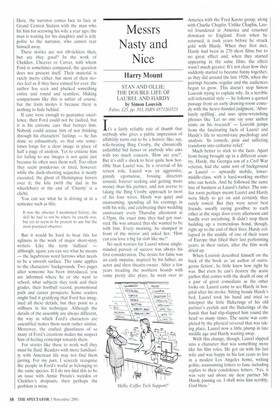Messrs Nasty and Nice
Harry Mount
STAN AND OLLIE: THE DOUBLE LIFE OF LAUREL AND HARDY by Simon Louvish Faber, £25, pp. 503, ISBN 0571203523 It's a fairly reliable rule of thumb that anybody who gives a public impression of affability turns out to be a horror: like, say, wife-beating Bing Crosby, the chronically unfaithful Sid James or anybody who asks with too much concern, 'How are you?'. But it's still a shock to hear quite how horrible Stan Laurel was. In a reversal of his screen role, Laurel was an aggressive, greedy egomaniac, bossing directors around, forever seeking and getting more money than his partner. and not averse to taking the Bing Crosby approach to most of his four wives. Hardy was quiet and unassuming, spending all his evenings in with his wife, and celebrating their wedding anniversary every Thursday afternoon at 4.35pm, the exact time they had got married. He was amazed that she wanted to be with him. Every morning, he slumped in front of the mirror and asked her, 'How can you love a big fat slob like me?'
No such worries for Laurel whose singleminded pursuit of success was always his first consideration. The desire for fame was an early impulse, inspired by his father, an actor and then theatre-owner. After a few years treading the northern boards with some pretty dire plays, he went over to America with the Fred Karno group, along with Charlie Chaplin. Unlike Chaplin, Laurel foundered in America and returned downcast to England. Even when he returned, it took years before he struck gold with Hardy. When they first met, Hardy had been in 270 short films but to no great effect and, when they started appearing in the same films, the effect wasn't much greater. It's not clear how they suddenly started to become funny together, as they did around the late 1920s, when the pairings became regular and the audiences began to grow. This doesn't stop Simon Louvish trying to explain why. In a terrible self-referential style — he follows a quoted passage from an early drawing-room comedy with the heavy-handed judgment, 'Absolutely spiffing', and uses spine-wrenching phrases like 'Let no one say your author stints on his research' — Louvish jumps from the fascinating facts of Laurel and Hardy's life to second-rate psychology and analysis: 'In comedy, pain and suffering transform into cathartic relief.'
Much better to stick to the facts. Apart from being brought up in a different country, Hardy, the Georgia son of a Civil War veteran, had the same sort of background as Laurel — upwardly mobile, lowermiddle-class, with a hard-working mother who ran hotels. And he followed the same line of business as Laurel's father. The similar roots perhaps meant Laurel and Hardy were likely to get on and certainly they rarely rowed. But they were never best friends, usually saying goodbye to each other at the stage door every afternoon and hardly ever socialising. It didn't stop them building up a tremendous bond, though, right up to the end of their lives. Hardy collapsed in the middle of one of their tours of Europe that filled their last performing years, in their sixties, after the film work dried up.
When Louvish described himself on the back of the book as 'an author of outrageous fiction', he little knew how right he was. But even he can't destroy the acute pathos that comes with the death of one of a pair of great comedians as the other looks on. Laurel came to see Hardy in hospital after his stroke. Sitting beside Hardy's bed, Laurel took his hand and tried to interpret the little flickerings of his old partner's eyelids and the flutterings of the hands that had slip-slapped him round the head so many times. The scene was completed by the physical reversal that was taking place, Laurel now a little plump in late middle age and Hardy wasting away.
With this change, though, Laurel slipped into a character that was something more like his film roles. He got on with his last wife and was happy in his last years to live in a modest Los Angeles home, writing polite, unassuming letters to fans, including replies to their condolence letters. 'Yes, it was very sad about my dear partner Mr Hardy passing on. I shall miss him terribly. God bless.'


















































































 Previous page
Previous page